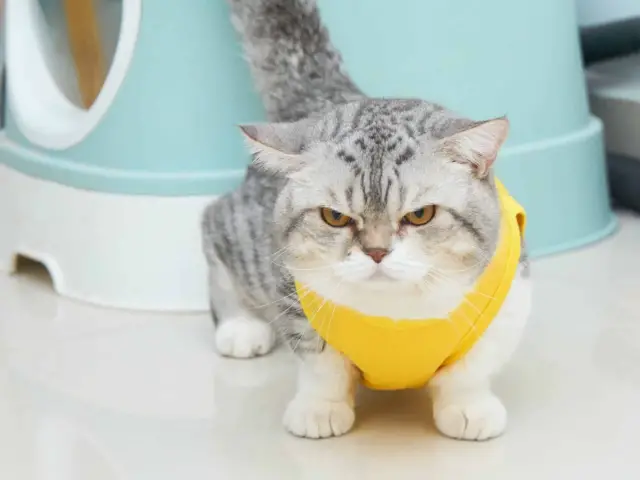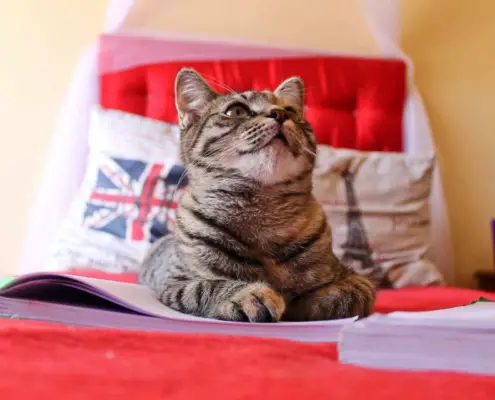
Various dwarf cat breeds have been developed by cat breeders, starting with the Munchkin in the 1940s. These adorable felines are characterized by their short legs, which are caused by a genetic mutation. Most major cat registries do not recognise dwarf cats, and in some countries breeding dwarf cats are prohibited, due to health concerns. In this guide, you will learn everything there is to know about dwarf cats, from their different types to their care and training. Whether you are considering adopting a dwarf cat or simply want to expand your knowledge about these charming creatures, this article is the resource for you.
Different Types of Dwarf Cats
There are several types of dwarf cats, each with its own distinct characteristics. The most well-known type is the standard dwarf cat, which has short legs and a normal-sized body. Another type is the rug hugger, which has even shorter legs and a longer body. Dwarf cat breeds have a unique appearance that sets them apart from other breeds.
Dwarf Cat Breeds and Their Specific Traits
There are several dwarf cat breeds, descendent from Munchkin crossbreeds, each with its own unique traits. The Munchkin is the most well-known and widely recognized breed. These cats have a sweet and affectionate temperament, making them a popular choice for families. The Bambino is another dwarf breed that is known for its hairlessness due to a crossbreed with Sphynx cats. These cats are social and love being the center of attention. The Napoleon, also known as the Minuet, is a breed that combines the short legs of the Munchkin with the folded ears of the Scottish Fold. These cats are known for their charming and playful personality.
Other dwarf cat breeds include the Dwelf (Munchkin x Sphynx x American Curl), Genetta (Munchkin x Bengal), Kinkalow (Munchkin x American Curl), Lambkin (Munchkin x Selkirk Rex), Minskin (Munchkin x Sphynx x Burmese x Devon Rex) and Skookum (Munchkin x LaPerm),
Small Cat Breeds That Are Not Dwarf Cats
Small cats that are not dwarf cats include the American Curl, Devon Rex, Cornish Rex, Korat, Selkirk Rex, Toybob and Singapura.
These cats are naturally small in size, without the genetic mutation responsible for dwarfism.
Characteristics and Appearance of Dwarf Cats
Dwarf cats have a variety of characteristics that make them special. Apart from their short legs, they are known for their playful and affectionate nature. Despite their small stature, they are agile and active. Their appearance can vary depending on the breed, but they generally have a compact body, a round face, and large, expressive eyes. Some dwarf cats also have a curly or wavy coat, adding to their charm. These cats come in a wide range of colors and patterns, making each one unique.
Health and Care for Dwarf Cats
Dwarf cats are generally healthy and can live long, fulfilling lives. However, they are prone to certain health issues due to their genetic mutation. One common problem is lordosis, a spinal deformity that can cause discomfort and difficulty in movement. Regular veterinary check-ups and a balanced diet are essential for maintaining the health of your dwarf cat. Additionally, proper dental care is crucial, as dwarf cats are more susceptible to dental issues. Grooming should also be a part of their care routine, as some dwarf cats have long coats that require regular brushing.
Pros and Cons of Owning a Dwarf Cat
Owning a dwarf cat comes with its own set of advantages and disadvantages. On the positive side, dwarf cats are known for their friendly and playful nature, making them excellent companions. Their small size also means they require less space compared to larger cat breeds. However, their short legs can sometimes lead to mobility issues, and they may not be able to jump or climb as easily. Additionally, some people have concerns about the ethical implications of breeding dwarf cats, as the genetic mutation can potentially cause health problems.
Training and Socializing a Dwarf Cat
Training and socializing your dwarf cat is important for their overall well-being and behavior. Start by introducing them to a variety of environments, people, and animals from a young age. This will help them become well-adjusted and confident cats. Use positive reinforcement techniques, such as treats and praise, to teach them basic commands and behaviors. It is also important to provide them with plenty of mental and physical stimulation to prevent boredom and destructive behavior. With patience and consistency, your dwarf cat can become a well-behaved and sociable pet.
Frequently Asked Questions About Dwarf Cats
- Q Are dwarf cats suitable for families with children? A Yes, dwarf cats can be great companions for families with children. However, it is important to supervise interactions between the cat and young children to ensure both parties are safe and comfortable.
- Q Do dwarf cats require special care? A While dwarf cats do not require any special care compared to other cats, they may have specific health needs due to their short legs. Regular veterinary check-ups and a balanced diet are important for their well-being.
- Q Can dwarf cats live with other pets? A Dwarf cats can live harmoniously with other pets, including dogs and other cats, if they are properly introduced and socialized from a young age.
Is a Dwarf Cat the Right Pet for You?
Dwarf cats are undeniably unique and captivating creatures. Their short legs and playful nature make them a popular choice for many pet owners. However, it is important to consider the specific needs and potential health issues associated with these breeds before making a decision. If you are willing to provide the necessary care and attention, a dwarf cat can bring joy and companionship into your life. Whether you choose to adopt a dwarf cat or simply admire them from afar, their charm and distinctive appearance will undoubtedly leave a lasting impression.
If you enjoyed my article, I would appreciate you sharing it with your network.

Sima Ndlebe
Sima writes for CatBuzz. He is interested in Cats, Health and Fitness, and Entrepreneurship.
Published: 23 October 2023



